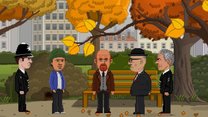Dead Drop review

- 1 Comment
Plenty of cozy investigative goodness tucked away in Carol Reed’s nineteenth Swedish mystery
It's hard to believe that the Carol Reed series has been with us for two decades now, but here we are at the start of a fresh new year yet again, accompanied by the release of the 19th installment since its humble origins in 2004. The one-man operation at MDNA Games has managed to deliver a new chapter like clockwork on an annual basis, yet Carol Reed isn't a name that conjures up the same sort of immediate recognition as other long-running adventure game legends like Guybrush, Gabriel, or even good ol' Tex. So just what is it about this low-key mystery series—which feels equal parts like an interactive version of a homey television whodunnit and an unofficial side project from a Swedish tourism board—that keeps its loyal audience ever hungry for more?
If you're a fan that's been following along, it probably won't be a surprise that Dead Drop delivers more of the same blend of enjoyable investigatory gameplay and soothingly simple environmental exploration. I came into this series only recently with 2020's Geospots, devouring it and the following two games in the course of a week, and with gusto. There's something about this style of gameplay that clicks with my brain, even though objectively, they really aren't great games. But they’re much better than mediocre: the cozy atmosphere and altogether casual nature of the gameplay make them a welcome comfort food of the point-and-click smorgasbord, if you will. Dead Drop doesn't quite reach the heights of Geospots (still my favorite Carol Reed entry), but given how consistent these games are, it doesn't fall very short of it, either.
Returning players know what they're in for: Dead Drop features throwback gameplay in a Myst-like slideshow presentation, where players guide the unseen Carol through a first-person viewpoint. Each screen is a (lightly manipulated) photograph of a real location—the series has an abundance of homes, parks, forests and usually at least one museum per game. There were perhaps a few too many repetitive wooded locations in Dead Drop for my taste, but I loved picking through its cabins, bunkers, and the homey atmosphere of Carol’s abode. From any spot, you can turn in the four cardinal directions (and in its trickiest moments, occasionally more) to look around for objects to stuff in your inventory and find new paths to reach your constantly updating objective.

Sometimes you'll pay a visit to Carol's friends or key witnesses to interview for pertinent information, but most of your time will be spent combing through relatively mundane locations looking for buried caches and cracking slightly larger-than-life puzzles where the logic can be a tad fiddly. There's no animation in the scenes you explore, nor is there video when you speak with other characters, just a few different photos of them making different expressions, accompanied by basic voice-over. It's a fairly minimalist approach that likely goes a long way in making it possible to crank these games out each year, but it's hardly a detraction.
Even though the production values have a very "homemade" quality, there’s something about that which gives the games a very entrancing flavor that have fully pulled me in. I love poking around in all the nooks and crannies of the down-to-earth locations, wandering remote forests, and solving unbelievable scavenger hunts in between moments of shaking down clues from characters who are decidedly not voiced by professional actors. There's just something so charming about it all that makes me want to (eventually) play the whole series, which might not be too Herculean a task considering I beat Dead Drop in a single three- to four-hour session.
Carol Reed games often like to play around with a certain theme or gimmick, and in Dead Drop the theme is, well, dead drops. For those who haven't brushed up on their spy terminology, a dead drop is a method of covert communication and a way to share items between two parties who wish to remain discrete—often leaving coded messages inside everyday objects at public locations to be found by the intended recipient.

This time around, Carol's client Erik is a government worker who recently found himself as the key person of interest from a shadowy organization keen on getting work-related secrets out of him—gently at first with easy money, but then with a bit more pressure. Erik turns to Carol once he realizes how out of his depth he is and finds it impossible to pull himself out, which leads to Carol stepping in on Erik's behalf, taking the burner phone provided to him by his nefarious "benefactors." With the villains none the wiser, you'll be receiving regular text communications from them indicating where to go and what to do, leading to the intercepting of numerous dead drops yourself.
Without giving too much away, my favorite thing about the central mystery in Dead Drop is that it isn't just concerned with contemporary shenanigans. There's some unresolved KGB business from the 1980s that rears its head too, and you'll be chasing down leads and digging up spy communications from a long-forgotten era to find out the true motivations of Erik's shady new employers.
There's really no need to be familiar with past games to play and enjoy Dead Drop. There are some details that returning fans will appreciate more than newcomers, and as always, series staples Stina and Jonas make their obligatory returns (as well as Bigge, beloved provider of side quests and the king of ever-changing entrepreneurial pursuits). It's fun to see them, but you won't find much of anything resembling an overarching story or deep character development for our protagonist, so Dead Drop is about as good an entry point as any.

Aside from a woeful initial challenge that had me stumbling around a small park for far too long looking for a hidden drainpipe, Dead Drop is roughly the same amount of challenge you might come to expect from the series by now—largely in the "easy to moderate" end of the spectrum, with its difficulty usually bolstered by the sheer number of locations available at a time. There wasn't enough mental juggling space in my head to remember all the various unsolved puzzle boxes I'd come across throughout the game, so players will likely benefit from keeping notes (or being prepared to ask for frequent nudges from the usually helpful in-game hint system that tells you where you ought to go next). There’s a journal feature that keeps track of the basic details of the case, but rarely will you need to actually use that sort of information. Dead Drop asks you to solve plenty of puzzles, but not to apply any sort of case-related deductive reasoning.
Carol Reed games habitually feature puzzles that don’t even pretend to plausibly integrate themselves in the game world. Throughout these games, you'll frequently end up finding things like locks that only open from hitting the correct combination of different colored buttons, and the clue to the lock sequence might be in some arbitrary location where some boulders might be painted in the order of the combination you need to enter. To its credit, Dead Drop makes a valiant effort to downplay that quirk of the series (for the most part), with its various lock puzzles feeling a bit more grounded and sensible within its plot centered around encrypted spy messages—though there are still a couple notably silly moments.
A fair amount of the game tasks you with busywork in between actual investigating, including doing Bigge's job for him and staging a children's scavenger hunt on behalf of your lazy friend Jonas. There are also two instances of solving fairly forced "videogame levels," where you help someone progress in a game on their phone (which happens to feature gameplay in the exact style as the rest of the Dead Drop experience), where the mechanics veer more into the realm of iffy moon logic.

I ran into only one bug, but unfortunately it was a nasty one. When trying the classic "using everything in the inventory" trick, I mistakenly opened up Carol's cell phone at an inopportune moment that caused everything to freeze—I could still move the cursor around but was no longer able to actually put the phone away and get back to exploring. My only recourse was to force-quit and reload a manual save that was, sadly, recorded a long time before that point. So even though Dead Drop features no dead ends or ways to lose, the classic "save early, save often" mantra is very much worth following. Thankfully, the series has always been generous with save slots; it would just be nice if MDNA implemented an autosave as well!
Music is a key factor in what makes the mood of these games work as well as they do, and I'm pleased to report that Dead Drop has a pretty nice soundtrack, on par with the other entries I've played. It evokes a nice mood in almost all instances, frequently calming, though occasionally a bit tense in the creepier locales. I really liked it, although there was one track that showed up in a couple locations that did feel a bit grating. It's not the sort of score you'd put on for deep listening, but I'd happily play it as background music.
Lastly, the story in this one, while not stellar by any means, kept me pretty invested. I’m a sucker for old unsolved cases, so the fact that Dead Drop weaves a decades-old mystery in amongst the more contemporary intrigue made for some enjoyable sleuthing. My favorite character was the retired ex-spy Peter Mysoft, who during your repeated visits to his home can be spotted playing Solitaire, Mahjong and eventually Grim Fandango (just how does international copyright law even work in Sweden anyway?). There's one moment near the end that seemed like it offered a branching choice—a rarity for this series—but after reloading my save, it seems that the choice has zero impact on how the story ultimately plays out. Still, even with that slight cop-out, Dead Drop has one of the more satisfying resolutions of the series (at least from a historical standpoint).
Final Verdict
If you haven't played a Carol Reed game before, Dead Drop feels like a pretty decent entry point. It’s not Carol’s best, but it shows plenty of the series’ strengths and gives a good taste of its weaknesses as well. These games aren't for everyone—especially adventure fans who need a bit more meat in their stories—but 20 years in, there's something comforting about their continued presence in our ever-evolving landscape. If you like a cozy mystery and aren't averse to somewhat contrived puzzles, you can't go wrong with this latest Carol Reed outing, available exclusively from the developer’s website. Heck, you might even come away with a desire to move to Sweden.
Hot take
Delivering everything series fans should expect by this point, Dead Drop is another soothing romp with Carol Reed through Swedish countrysides and dilapidated buildings, elevated by a fun hook and some decades-old KGB intrigue that helps to make up for the more humdrum moments.
Pros
- Central mystery is full of rather interesting Soviet-era spy history
- Enjoyable soundtrack
- Overall mood is as cozy and inviting as ever, sure to satisfy returning fans
Cons
- A few silly puzzle solutions
- Voice acting is a mixed bag
- Easy to waste lots of time pixel hunting without using the hint system
Sean played Dead Drop on PC using a review code provided by the game's publisher.

- Advertisement
- Help support AGH by advertising with us










1 Comment
Want to join the discussion? Leave a comment as guest, sign in or register.
Love this series!
Reply
Leave a comment